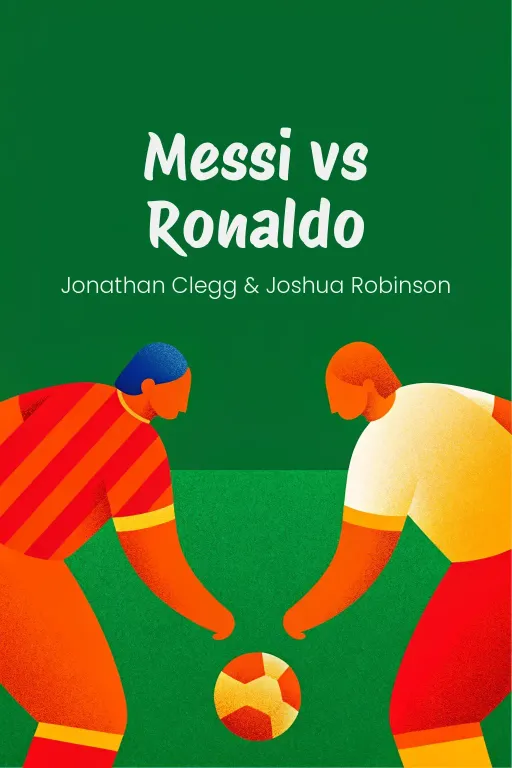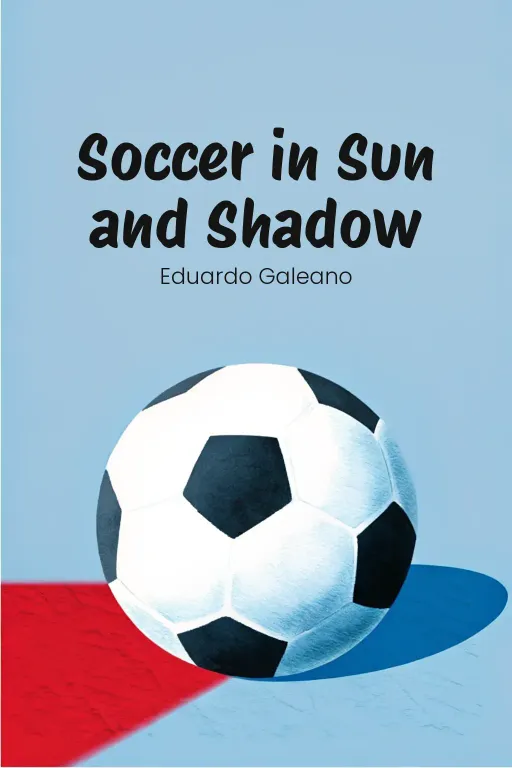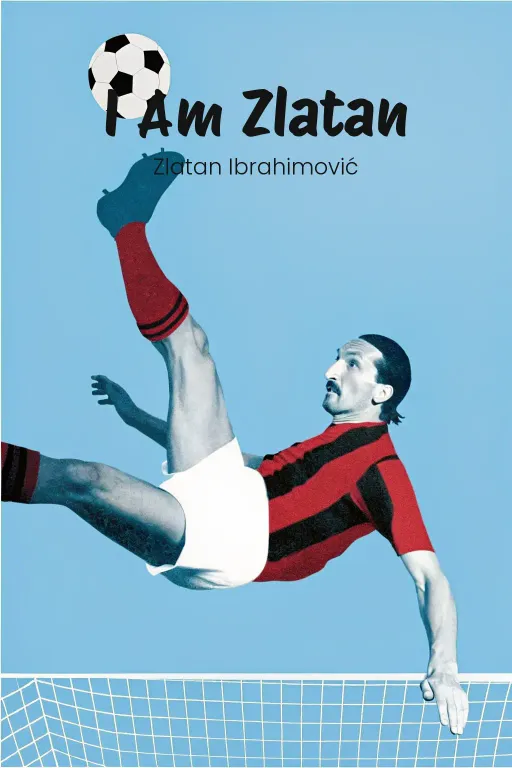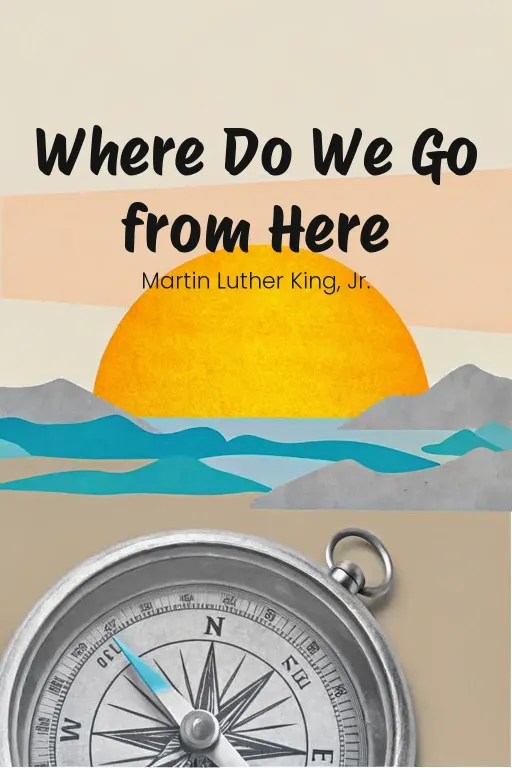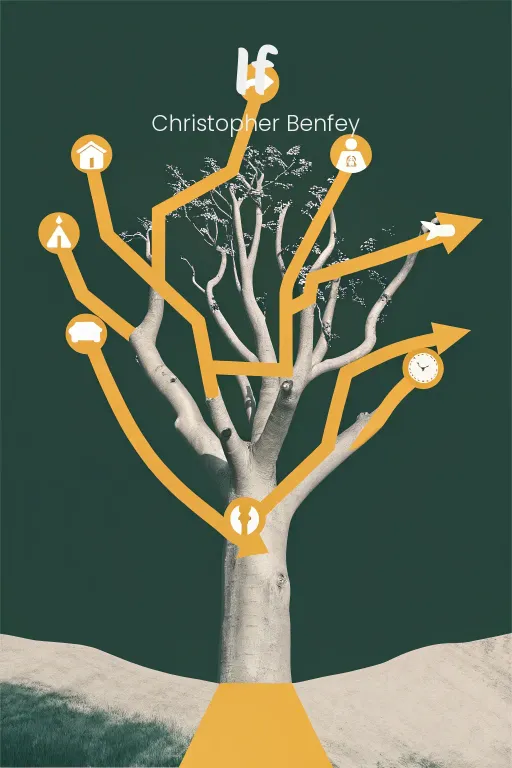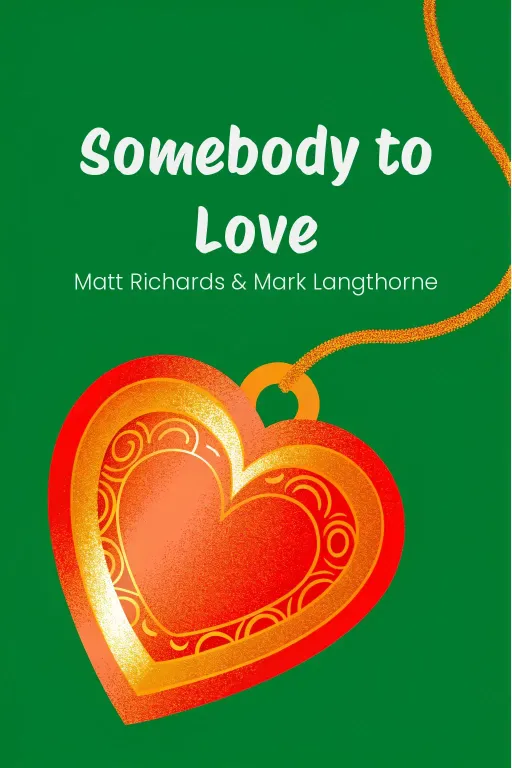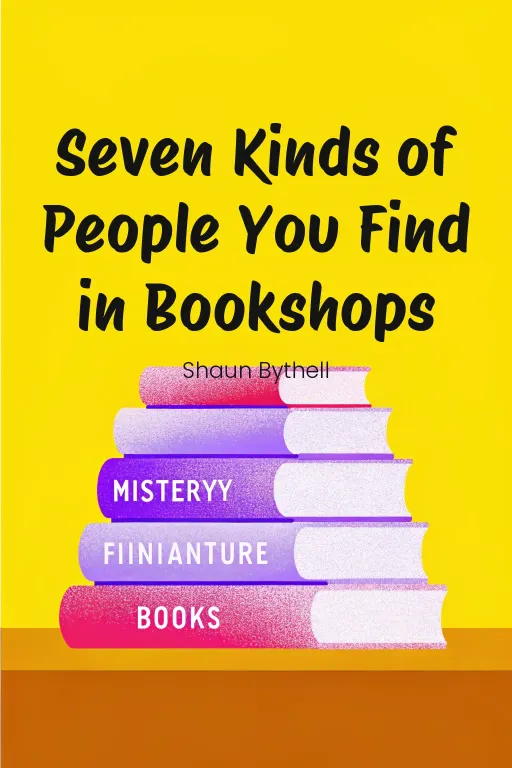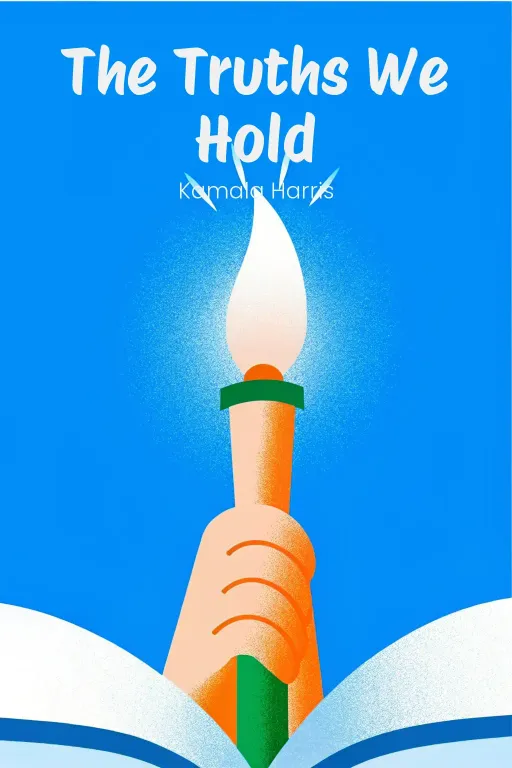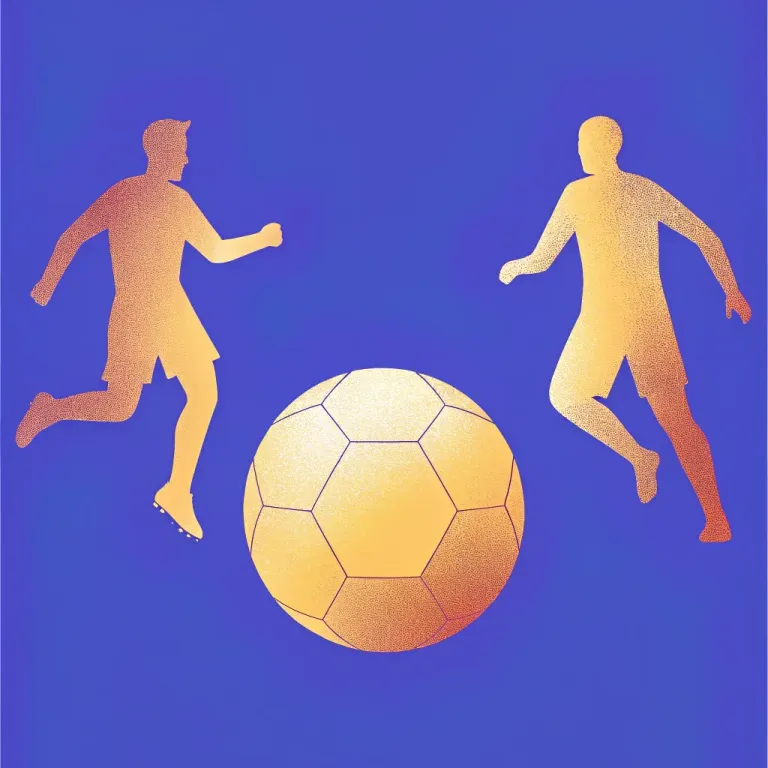
Messi vs. Ronaldo: More Than Just Goals?
Podcast by Let's Talk Money with Sophia and Daniel
One Rivalry, Two GOATs, and the Era That Remade the World's Game
Introduction
Part 1
Daniel: Hey everyone, welcome to the show! Today, we're diving into one of the greatest rivalries of all time: Lionel Messi versus Cristiano Ronaldo. It's more than just talent versus hard work; it's like artistry meeting sheer dominance. It's a clash that goes way beyond just soccer. Sophia: Absolutely, Daniel! And let’s be real, this isn’t just about choosing your favorite player, is it? This rivalry's actually changed the whole game. I mean, if you've ever argued about this with your friends, or maybe even online, you're exactly who we’re talking to today. Daniel: Exactly! We’re talking about a book that doesn’t just tell their stories. It “really” shows how Messi and Ronaldo have changed soccer itself. From a kid in Rosario, Argentina, to the boy from Madeira, Portugal, their stories are as captivating as what they've accomplished. We want to explore how their rivalry is a lens to view how culture, economics, and identity of modern football have changed. Sophia: Right, and that’s where it gets super interesting. We're talking about a global phenomenon. These guys aren't just athletes, are they? They're brands, role models, and, well, for better or worse, symbols of where the sport is now. So, Daniel, what's our game plan for today? Daniel: I’m so glad you asked. We’re going to look at three main things. First, their impact on culture and business—how their rivalry became this global obsession. Secondly, how they've reshaped club identities and the money side of soccer—transfer deals, how fans act, all that. And lastly, what their lasting impact will be. How their era has set new bars and inspired, you know, a whole generation of players. Sophia: So, basically, we’re treating this like a game itself. First half, second half, then extra time. Only here, the stakes aren’t goals, but the future of soccer. Right, let's jump in!
The Rivalry and Its Cultural Impact
Part 2
Daniel: Okay, let's dive right into the genesis of this epic face-off. It's really quite something how Ronaldo and Messi, coming from such different worlds—Madeira and Rosario, respectively—found themselves sharing the stage back in 2007 at the FIFA World Player Gala. Remember? Both these incredible talents were kind of in Kaká's shadow at that point. But looking back, that night feels more like the opening scene of a movie. Sophia: Exactly, Daniel. It’s one of those moments where you think, "Ah, the tranquility before the storm." There's Ronaldo, brimming with charisma, already sculpting his "I'm destined for greatness" image. And then there’s Messi, this almost reticent prodigy. The contrast is stark, and honestly, that’s what makes their story so gripping. Though, seriously, both losing out to Kaká? That's rough. Daniel: It gives you some perspective, doesn't it? But I do think that night sowed the seeds for what evolved into an unparalleled rivalry. When you look at their journeys, you’ve got Messi, who was essentially raised in Barcelona’s La Masia. It’s the classic tale of a player shaped by a single club's ethos, embodying loyalty and precision. And then there's Ronaldo, who, let's be honest, has constantly reinvented himself. From Sporting Lisbon to Manchester United, then Real Madrid… he’s always rewriting his narrative to prove he belongs at the top. Sophia: Which leads us to the real ignition point of their rivalry - Ronaldo's colossal move to Real Madrid in 2009. The stage couldn't have been set more perfectly: Messi already reigning supreme at Barcelona when—boom—Ronaldo arrives in La Liga with that €94 million price tag, like a force of nature. Reminds you of something out of a Shakespearean play. Barcelona versus Real Madrid, Messi versus Ronaldo. Suddenly, it's not just about soccer, is it? It's a cultural phenomenon. Daniel: Precisely. Their rivalry elevated El Clásico into a truly global spectacle. Remember that November 2010 game? Barcelona’s 5-0 demolition of Real Madrid? Messi was just untouchable, creating opportunities left and right, scoring, practically conducting the entire match. It was tiki-taka at its finest, and Messi was its perfect expression. Sophia: But then, flash forward a few months later to the 2011 Copa del Rey final. Ronaldo responds with that gravity-defying header in extra time. The sheer power in that jump, right? He could've been trying out for Cirque du Soleil. That wasn't just winning a trophy; it was Ronaldo asserting his dominance, saying, "You've got artistry, sure, but I bring pure, unadulterated physicality to the table." Daniel: Exactly those moments, they were more than just about goals. They were emblematic of what each player stood for. Messi always seemed like he was part of something bigger, Barcelona’s whole system of passing, movement, and collective harmony. Ronaldo, on the other hand, was the ultimate individual, the kind of player who could single-handedly carry his team to victory through sheer force. Sophia: And we can't overlook how social media just poured fuel on the fire. Every Messi free-kick, every Ronaldo hat-trick, instantly became a trending topic. Who had the better style? Whose records held more weight? Those hashtags—#TeamMessi and #TeamRonaldo—they were battlegrounds. You had fans going at it in the comments sections as if it were their day job. Daniel: Oh, without a doubt. And these guys' online personas played a huge part in amplifying the rivalry. Messi always came across as this grounded, almost reluctant star, while Ronaldo leaned into his persona as the showman—the self-made superstar. Messi was the quiet artist; Ronaldo was the performer who basked in the spotlight. Sophia: It just made their competition even more polarizing. And what’s fascinating, Daniel, is the way it extended beyond their personal brands to the clubs themselves. Barcelona became the poster child for a more traditional, organic style of soccer, rooted in nurturing young talent and a collective spirit. Meanwhile, Real Madrid was all about the Galácticos—a team built on star power and global appeal. Fans weren't just rooting for players; they were endorsing entire philosophies. Daniel: Absolutely, and what’s amazing is how the rivalry wasn’t confined to the pitch. It shaped the economics of the entire sport. Think about Ronaldo’s move to Real Madrid. That €94 million wasn’t just a record fee; it symbolized how one individual could transform a club's marketability overnight. The jersey sales alone were incredible. Sophia: Then you've got Messi’s long-standing partnership with Adidas. Those campaigns portraying him as the very essence of soccer—pure and untainted—were designed to resonate emotionally. But Ronaldo’s Nike campaigns were the complete opposite: cutting-edge, sleek, and all about pushing the boundaries of athleticism. Seeing those ads was like being asked to choose between classical music and EDM. Daniel: And that’s the genius of their rivalry – it didn’t just inspire fans; it redefined how brands market athletes. Together, they created a financial ecosystem where the sport and its top athletes became billion-dollar industries. Their influence extended way beyond the soccer field, shaping how athletes are seen as global celebrities. Sophia: So here’s a question for you, Daniel – and indulge me for a moment – do you think all this commercialization, all the branding and marketing, ends up cheapening their rivalry, or does it actually enhance their legacy? Daniel: That's a valid point, Sophia. It really depends on your perspective. Sure, the commercial aspect adds a layer of spectacle, but it also highlights just how massive their impact has been. They didn’t just change soccer; they transcended it, influencing culture, economics, and even our values. Sophia: I think that’s right. And ultimately, it’s not just about the goals they've scored, but the world they've influenced. They've given us more than just soccer, Daniel; they've given us a rivalry that mirrors everything from ambition to the global influence of the beautiful game.
Evolution of Club Identities and Financial Transformations
Part 3
Daniel: You know, from their early careers to global stardom, Messi and Ronaldo’s rivalry is just… a cultural phenomenon. But what's truly fascinating is how their genius mirrored, and even drove, some really big changes in soccer. I mean, strategically, financially, even philosophically, clubs just weren't the same. So, let’s dive into how they shaped club identities and all these financial transformations. Sophia: Absolutely, so you're saying it's not just about the goals. It's about a fundamental change in how clubs are run. And you can't ignore the rise of financial powerhouses like PSG and Man City during this period. So, Daniel, paint the picture – what’s the core connection between their careers and these club transformations? Daniel: Well, at the heart of it, they were both catalysts and symbols of broader trends. Take Messi and Barcelona. It wasn't just his crazy talent; it was so deeply tied to the club’s identity. Barcelona under Pep Guardiola, with La Masia, was all about homegrown talent and beautiful, possession-based soccer. Sophia: So Messi was basically the embodiment of this utopian soccer ideal, right? A local kid becoming a global icon. But it didn't last forever. At some point, that ideal began to fall apart, didn’t it? Daniel: Exactly. As Messi rose to prominence, Barcelona started shifting gears, financially and strategically. I’d say a really pivotal point here was signing Neymar in 2013. It marked a pretty big departure from their values. I mean, all of a sudden, they weren’t just developing players anymore – they were actively chasing global superstars to complement Messi. And let’s be honest, Sophia, that Neymar deal was riddled with drama. Hidden fees, legal battles, the whole nine yards. It revealed a darker, more complex side to how they operated. Sophia: Oh, don’t even get me started, Daniel. That Neymar transfer fee wasn’t just huge. It was like opening Pandora’s Box! Sure, we got the "MSN" era with Neymar, Messi and Suárez. But it was this massive gamble, wasn't it? Incredible on the pitch, but it really pushed Barcelona into some pretty uncomfortable financial territory. Daniel: Totally. 'MSN' was extraordinary. I mean, look at the 2014-2015 season – they won the treble! Amazing. But it came at a cost. Barcelona was just so reliant on Messi. They called it "Messidependencia". It shaped every decision. If Messi needed reinforcements, the club spent big – and often recklessly – to build around him. That financial recklessness ultimately led to €1.2 billion in debt, which, as we know, made Messi’s exit in 2021 inevitable and heartbreaking. Sophia: Then you look at Ronaldo joining Real Madrid? It's a completely different story altogether. His arrival in 2009 wasn’t about some long-held ideal. It was Florentino Pérez rebuilding his Galáctico project, making this massive €94 million statement to the world: "We’re here to dominate." Daniel: Exactly! Ronaldo was the embodiment of Real Madrid’s vision under Pérez: a global superstar to solidify their dominance, on and off the pitch. His charisma and work ethic made him the perfect face for this strategy. And it worked! From record jersey sales, to Champions League success, Ronaldo really drove Real Madrid to new heights. Sophia: And let’s not forget moments like that bicycle kick against Juventus in 2018. It wasn’t just a goal; it was a brand-defining moment for Ronaldo and for Madrid. But even at Real, his departure in 2018 revealed some cracks, didn’t it? They suddenly had to rethink things, trade in Galácticos for younger players, and find more sustainable strategies. Daniel: They did, Sophia. That move to youth – players like Vinícius Júnior and Rodrygo – reflected an understanding that even the big clubs had to adapt. Especially with rising competition, you know, from state-funded clubs like PSG and Man City. They were essentially rewriting the rules. Sophia: Speaking of rewriting rules, PSG really changed the game with that Neymar transfer in 2017. €222 million! The audacity of breaking financial norms like that? Nobody saw it coming. And then they doubled down, they went and signed Messi in 2021. Daniel, do you think PSG's approach here is more about pure dominance, or more of a cultural statement? Daniel: I think it’s both. When Neymar signed, it wasn’t just about football, it was Qatar announcing PSG as a global brand and increasing soft power through sports. With Messi, they didn't just add an amazing player; it sends the message that they can outmaneuver traditional giants like Barcelona. Sophia: And then there’s Man City under Sheikh Mansour. They weren’t making the same immediately splashy moves at first, as PSG, but let's be honest , they've totally transformed what it means to build a superclub. It wasn't just about signing stars like Haaland, but about building a global franchise, the infrastructure, focusing on the long game. The contrast with a Real Madrid or Barcelona is… well, it's pretty stark. Daniel: It is. The City Football Group model is a paradigm shift, really. They developed world-class facilities, aligned talent to Guardiola’s vision, and it balanced immediate success with long-term sustainability. What it all ties back to is how the global stars like Messi and Ronaldo laid the groundwork for these massive investments in the first place. Sophia: So, what you’re saying is, Messi and Ronaldo weren’t just taking part in this transformation, they were accelerating it. Their success, the fans they brought in, that pushed clubs to think on a much different scale, spend more intelligently... or, in some cases, maybe just spend recklessly. Daniel: Precisely! It's almost… ironic, though. While Messi and Ronaldo elevated these traditional clubs, they also exposed their weak points. State-backed clubs – PSG and City – they exploited the weaknesses – you know, financial mismanagement, an overreliance on aging stars – and positioned themselves to really dominate going forward. Sophia: Yeah, that's the thing, isn't it? Their legacies aren't just about goals and trophies. It’s about this fundamental shift in the game. The way clubs operate, who controls the money, where the real power lies in soccer today.
Legacy and the Next Generation
Part 4
Daniel: So, their careers really reflect how much modern soccer has changed, you know? Players have so much more power now, and money really dictates who succeeds. Looking back, though, their legacy is what's really interesting, especially how they've shaped the next generation. Sophia: "Legacy and the Next Generation," huh? Sounds like a blockbuster sequel! Messi and Ronaldo kinda are the superheroes of soccer, aren't they? So, Daniel, what's the angle here? Daniel: Well, it's like a ripple effect from their careers. I'm thinking about three major things. First, how they directly influenced stars like Kylian Mbappé and Erling Haaland. Second, how they changed the business of soccer – turning players into brands. And finally, the life lessons they taught us, both on and off the field, and what those mean for the players of tomorrow. Sophia: Right, so let's talk about their "protégés," I guess. Mbappé and Haaland. Are they just living in the shadows, or are they actually building on what Messi and Ronaldo started, do you think? Daniel: Exactly, neither Mbappé nor Haaland are carbon copies. They're evolving soccer, but building on the foundations laid by Messi and Ronaldo. Take Mbappé. He grew up idolizing Cristiano Ronaldo. His bedroom was basically a shrine to CR7. Sophia: And now he's the guy giving defenders nightmares! You can definitely see the Ronaldo influence, though. The pace, the explosiveness, the killer instinct in front of the goal– I mean, his 2018 World Cup performance for France was electric. Daniel: Right! That final against Croatia? Mbappé scored, becoming only the second teenager ever to score in a World Cup final, after Pelé. His composure, his swagger – very Ronaldo-esque. But what’s interesting is that, unlike Ronaldo, who worked his way up, Mbappé just exploded onto the scene, almost instantly. Sophia: True. Then there’s Erling Haaland, who feels like a completely different successor. Forget the fancy footwork – this guy’s all about raw power and scoring goals. He's like he took pieces of Messi and Ronaldo, just with his own twist. Daniel: Haaland is so direct, so focused on breaking records, unapologetically. But yeah, his discipline and work ethic? Definitely Ronaldo. And that calm under pressure? Reminds me of Messi. Plus, his dad was a pro footballer. He grew up understanding the demands of the game, like Messi at Barcelona's La Masia. Sophia: So, circling back to Messi and Ronaldo as the ultimate models, right? Haaland and Mbappé aren’t just learning how to win; they’re learning how to navigate the world Messi and Ronaldo created. The media scrutiny, the brand deals, the insane expectations, week in and week out. Daniel: Exactly, which brings us to their impact on soccer’s commercial side. What Messi and Ronaldo did off the field is just as big as what they did on it, if not bigger. They turned soccer players into global brands that reach far beyond the sport. Sophia: The business of being the GOAT, as they say. When Ronaldo partnered with Nike, you would've thought he was running for president, not just endorsing sneakers! And then you have Messi with Adidas, this understated, almost artistic vibe. Daniel: Yeah, it's a fascinating contrast. Ronaldo, you know, with his team shaping his image, went for luxury and aspiration. Nike, hotels, fragrances – it's all about ambition and innovation. Messi, on the other hand, is more about humility and artistry. His connection with Adidas really shows that. His campaigns highlight beauty of the game, rather than dominance. Sophia: But here's what I'm wondering Daniel. Don't younger players like Mbappé take more from Ronaldo’s playbook? I mean, think about his Nike endorsements or how he's building himself as a global icon, not just a soccer player. It feels like the next generation is leaning more toward Ronaldo's hyper-marketable model. Daniel: That’s partly true, sure. Mbappé does have that "superstar entrepreneur" thing going on. But Messi's influence is there, too, especially in players like Pedri or Gavi at Barcelona. Young players who value skill and intelligence on the field over all the flash. Messi’s legacy shows that humility and teamwork can be marketable, too, just in a different way. Sophia: Maybe it's less about copying and more about adapting , finding your own path. Like Haaland taking Ronaldo's physicality and Messi's efficiency. It shows how they've expanded what a soccer player can even be. Daniel: Exactly. And beyond the brand deals and goals, the real legacy is the life lessons they've taught us. Look at how Messi overcame his growth hormone deficiency, leaving his home for Barcelona as a kid. His story teaches perseverance and humility. Sophia: Compare that to Ronaldo. Growing up in Madeira, dealing with personal loss, pushing himself at every step. His life's about resilience and ambition. It’s a reminder that talent isn't everything. Daniel: And that’s what’s so great about it, Sophia. Perseverance, determination, creativity, teamwork – these are timeless. They apply far beyond the soccer field. For young players, clubs, and fans, Messi and Ronaldo offer something bigger than just trophies. Sophia: That's what makes their legacies almost… timeless. Each generation will grow up hearing their stories, analyzing their clashes, debating who's better. But more importantly, they’ll internalize the qualities that defined them – artistry or ambition, finesse or intensity. Daniel: Exactly, Sophia. It’s not just about the moments on the pitch, you know? It's about the players, the fans, the dreamers their careers continue to inspire every single day. It's that combination of talent and humanity that makes their stories bigger than just the game itself.
Conclusion
Part 5
Daniel: So Sophia, as we wrap up today's discussion, it's pretty clear that Messi versus Ronaldo is way more than just a rivalry, right? It's become a story that's bigger than soccer itself, changing how we see the sport's impact on everything—culture, clubs, even economies. Sophia: Totally, Daniel. It's not just about the goals or the trophies, is it? It’s about how their rivalry mirrors these huge shifts—you know, traditional clubs evolving, these state-funded giants coming in, and players becoming these global icons. They didn't just play the game; they redefined it. Daniel: Exactly! And even now, as their careers are winding down, their influence is still felt everywhere. Through players like Mbappé and Haaland, through clubs that are re-writing the definition of success, and through those classic stories of ambition and skill... Their impact will last for generations. Sophia: Okay, so here's the thing for our listeners: Messi and Ronaldo have shown us that being great isn't just about stats or trophies. It's about the changes they brought about, turning rivalries into these huge spectacles, clubs into dynasties, and soccer into a global language that everyone understands. Their legacies “really” challenge us to think differently about what it means to achieve something great—and to inspire others. Daniel: As we think back on their amazing careers, let's leave everyone with this question: Do we define greatness by the moments we create, or by how much we change the world around us? Because Messi and Ronaldo have definitely done both. And honestly, the debate about their impact? It's never going to end, just like our love for the game. Sophia: And there you have it—the ultimate rivalry—still fascinating us, challenging us, and inspiring us. Until next time, let's keep celebrating the players who just make us love the beautiful game that much more.
